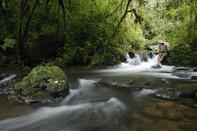A Town of Green and Gold
Undulating pine and eucalyptus plantations, patches of indigenous woodland, sweeping grassland ridges, cascading waterfalls and clear mountain creeks… Sabie may just as well have been known for a ‘green’ rush as for its gold rush.

These emerald surrounds as well as an intriguing history make the town a great destination for tourists keen to explore anything from gold panning or fly-fishing for wily river trout to riding some of the best off-road Mountain biking trails in South Africa.
Perched at an altitude of 1 100 m above sea level (ASL), right upon the edge of the inland escarpment sweeping down towards the Lowveld, Sabie falls within a summer rainfall region and is regularly drenched, especially in January and February. Mist often transforms the lower-lying valleys into a mystical fairyland during the summer months, while winters are nippy at most.
History of Sabie
There’s no denying that this quaint logging town has its history firmly rooted in the early gold rush days. Urban legend has it that gold was discovered when a stray bullet chipped a rock during a hunting expedition in 1871, thus revealing a glint of mother lode to the hunters. Weeks later the gold rush was in full swing, but Sabie only officially became a village in 1916.
The name Sabie comes from the Shangaan word for the river here – uluSaba, or ‘River of Fear’, so called as it was often in flood and teemed with crocodiles. Fortunately one can now fearlessly wander through the peaceful streets, while browsing in a host of shops selling everything from crafts and pancakes to leather goods.
Take time out to admire the colourful mosaic at the Post Office and the charming St Peter’s Anglican Church, built by a team of Italian stonemasons in 1913. Did You Know?: The burgeoning South African Forestry Industry, one of the major commercial entities in the Sabie region, plants a staggering 90 million trees every year.